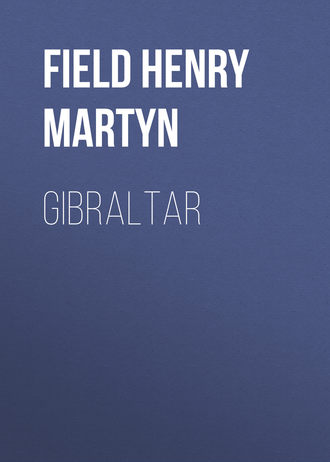 полная версия
полная версияGibraltar
"His Excellency wishes every attention to be shown him: so you will send a Boarding Officer to-morrow at 6 P.M., and ask him at what hour he desires to leave from Waterport, and have a launch ready for him: the Boarding Officer making all arrangements for Dr. Field and his friends passing through the gates.
Gifford."On the back of the above order was written in red ink, in very large letters:
"Boarding Officer: Comply with His Excellency's wishes.
"G. B. Bassadone,"For the Captain of the Port."This was the first time in my life that I had been waited upon for orders! Having this greatness thrust upon me, I did not betray my unfamiliarity with such things by any light and trivial conduct, but kept my dignity with a sober face, and graciously announced my sovereign pleasure to depart the following evening at eight o'clock. This was really a great convenience, as it gave me a few hours more on shore, whereas otherwise I must leave before sunset, when the gates are shut, not to be opened till morning. Appreciating not only the courtesy, but the distinction, I invited an American party at the Hotel to keep me company. But they had already made their arrangements, and went off ingloriously before "gun-fire"; while His Republican Highness took his dinner quietly, and awaited the coming of his escort. One young lady, however, (a cousin of Mr. Joseph H. Choate, of New York, my friend and neighbor at our summer homes in the Berkshire Hills,) stood by me, and at eight o'clock in the evening we walked down Waterport Street, attended by two stalwart defenders. The street was strangely silent, for as the outsiders leave at sunset when the gates are closed, the town is very quiet. It was dark as we approached the first gate, which had been shut hours before; but the guard, having "received orders," instantly appeared to unlock it, a form which was repeated at the second line of fortifications. At the quay we found the launch ready, with steam up, and as we took our places in the stern of the boat, on the cushioned seat provided for distinguished guests, I felt as if I were a Lord High Admiral. It was a beautiful night. The moon was up, though half hidden by clouds, from which now and then she burst forth, covering the bay with a flood of light. At that moment – stern Puritan as I am, and impassible as my friends know me to be – if I had been put upon my oath, or my honor, I should have been compelled to confess, that to be floating over a moonlit sea, with a fair countrywoman at my side, was not altogether the most miserable position in which I have ever been placed in my wanderings up and down in this world.
Once on the deck, the whole broadside of the Rock was before us, with the lights glimmering far up and down the heights. At half-past nine the last gun was fired, and in another half hour the lights in the barracks were put out, and all was dark and still.
It was midnight when the steamer began to move. The moon had now flung off her misty veil, and risen to the zenith, where she hung over the very crest of the Rock, her soft light falling on every projecting crag. The ship itself seemed to feel the holy stillness of the night, and glided like a phantom-ship, almost without a sound, over the unruffled sea. As we crept past the long line of batteries, the great Fortress, with its hundreds of guns, was silent; the Lion was sleeping, with all his thunders muffled in his rocky breast. Thus our last glimpse of Gibraltar was a vision not of War, but of Peace, as we rounded Europa Point and set our faces toward Africa.
1
: The exact figures of this Armstrong Gun are: Weight, 101.2 tons. Length, 32.65 feet. Length of bore, 30.25 feet. Diameter of bore, 17.72 inches. Length of charge of powder, 5 feet. Weight of charge, 450 pounds. Weight of shot, 2,000 pounds. Velocity at the muzzle, 1,548 feet per second. At such velocity, a ball of such weight would have a "smashing effect" of 33.230 "foot-tons," and would penetrate 24.9 inches of wrought iron. Range, when fired at the highest elevation, over 8 miles.
2
: A letter received from Sir Charles Wilson, who was in the column that crossed the desert, and who went up the Nile and arrived in sight of Khartoum only to learn that the city had fallen and Gordon been killed, speaks warmly of both these officers, his old companions in arms. He says: "General Earle, who was killed at Kirbekan, was a regimental officer in the Guards, and had been on the staff in Canada and India – in both cases, I think, as military secretary to the Viceroy. He was much beloved by every one. Colonel Earle, who commanded the South Staffordshire Regiment, was also killed at Kirbekan. He originally rose from the ranks, and was looked upon as one of the best regimental officers up the Nile.
3
: War Services of General Officers, in Hart's Annual Army List for 1882.
4
: The above outline is derived chiefly from Chalmers' Biographical Dictionary, a work in thirty-two octavo volumes, published in London more than seventy years ago (in 1814). I have sought for fuller information from other sources, but without result. The "Encyclopædia Britannica," in its article on Gibraltar refers to a "Life of Eliott," but I have not been able to find it either in the United States or in England. After a fruitless search in the Astor Library, with the aid of the Librarian, I cabled twice to London, the second time directing that search be made in the British Museum, but received reply that the book could not be found. The American Consul at Gibraltar writes me that he cannot find it there. Can it be possible that there is not in existence any full and authentic record of one of the greatest heroes that England has produced? Has such a man no place in English history except to furnish the subject of an article in a Biographical Dictionary?
5
: The incidents so briefly told in the following sketch are derived chiefly from "A History of the Siege of Gibraltar," by John Drinkwater, a Captain in the 72d Regiment, which formed part of the garrison, and who was therefore a witness and an actor in the scenes he describes. His narrative, though written in the plain style of a soldier, yet being "compiled from observations daily noted down upon the spot," is invaluable as a minute and faithful record of one of the greatest events in modern war.
6
: Sayer's History of Gibraltar, pp. 297, 298.
7
: Sayer's History of Gibraltar, pp. 346, 347.
8
: Drinkwater, p. 68.
9
: It is a common saying that the brave are generous, but this is not always so. Some of the bravest men that ever lived have been cold-hearted and cruel. But Eliott, though he had an iron frame and iron will, was as soft-hearted as a woman. Nothing roused his indignation more than an act of inhumanity on the part of a superior toward an inferior. Hence he was the protector not only of women and children, but of prisoners who fell into his hands, and who might otherwise be exposed to the license of soldiers demoralized by victory. He repressed all pillage and stood between the victors and the vanquished, as the defender of the defenceless. So noted was he for his humanity that those who were in trouble sought his protection, and his response to their appeals sometimes took them by surprise. An amusing illustration of this occurred some years before at the capture of Havana: A Frenchman who had suffered greatly by the depredations of the soldiery, came to him, and begged in bad English that he would interfere to have his property restored. But his wife, who was a woman of high spirit, was angry at her husband that he should ask any favor of an enemy, and turned to him sharply, saying, "Comment pouvez vous demander de grace à un homme qui vient vous dépouiller? N'en esperez pas." The husband persisting in his application, the wife grew more loud in her censure, and said, "Vous n'étes pas Français!" The General, who was busy writing at the time, overheard the conversation, and as he spoke French perfectly, turned to the woman, and said smiling, "Madame, ne vous échauffez pas; ce que votre mari demande lui sera accordé." At this she broke out again, as if it were the last degree of indignity, that the Englishman should speak French: "Oh, faut-il pour surcroit de malheur, que le barbare parle Français!" The General was so much pleased with the woman's spirit that he not only procured them their property again, but also took pains to accommodate them in every respect. —Chalmers' Biographical Dictionary.
10
: Sayer's History, p. 365.
11
: "The shot were heated either in the grates and furnaces made for that purpose, or by piling them in a corner of some old house adjoining the batteries, and surrounding them with faggots, pieces of timber, and small coal." Afterwards "the engineers erected kilns (similar to those used in burning lime, but smaller) in various parts of the garrison. They were large enough to heat upwards of one hundred balls in an hour and a quarter." —Drinkwater.
12
: A few months after I left Gibraltar, the old Arab was set at liberty by the British Government, but on very strict conditions. A letter from the American Consul, in reply to my questions, says:
"Zebehr Pasha was released August 3, 1887, on signing a certain document sent from the Home Government relative to his future conduct. This was an engagement 'to remain in the place which should be chosen by the Egyptian Government; to place himself under its surveillance; and to abstain from interference in political or military questions relating to the Soudan or otherwise.' This he signed in the presence of two British staff officers. He had arrived in Gibraltar in March, 1885, and from that time had been a prisoner in the Governor's cottage for about two years and a half, under charge at different times of several officers of the garrison. He left Gibraltar August 16th, for Port Said, accompanied by his household, which included two women and three men, and was attended by three male and two female servants. He also took back to his African home an infant born in the Governor's cottage at Europa."




